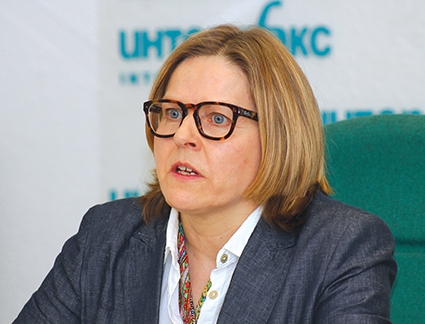EP Vice President on the Muktharli Case
Exclusive Interview
The Muktharli saga continues: the imprisoned Azerbaijani journalist, on a two day leave to attend the funeral of his close relatives, told press that his kidnapping from Tbilisi last year took place with the direct participation of Ex PM Ivanishvili, with the knowledge of current Prime Minister Giorgi Kvirikashvili. While the government summarily dismissed Muktharli’s claims, it is undeniable that cases like his make onlookers question whether everything’s right with cherished Georgian democracy. One such case is that of Mustafa Emre Cabuk, a Turkish teacher who has spent months in pre-detention on largely dubious charges, awaiting (and dreading) subsequent extradition to Turkey, where he says he’ll be presented with a mock trial and inhuman treatment in prison. Both Muktharli and Cabuk’s cases have become topics of discussion between Georgian authorities and their Western partners, something that Vice President of the European Parliament, Finnish MEP, Heidi Hautala was only too keen to underline in an interview with GEORGIA TODAY.
Many in Georgia and the West assume the Gov’t of Georgia is being bullied by the Turkish gov’t into keeping Cabuk in detention. Would you agree?
I’ve mentioned the Cabuk case several times to my colleagues in Georgian Parliament, to the Minister of State for Euro-Atlantic integration, and my good old friend Dolidze, with whom we share Euronest co-presidency. I have the impression that Georgia was persistent to pressure because I was confident that the Georgian Members of Parliament and Government would understand it to be really very damaging for the reputation and the standards achieved by Georgia if they caved in to pressure from Turkey.
As for Muktharli, I can quote your former ombudsman on the Mukhtarli case, in one of his last statements: “After six months, the Prosecutor’s Office has not informed the public of the results of the investigation, which would have strengthened confidence in an effective investigation.” It’s a serious case and it’s also about the sovereignty of Georgia. Now is when the Georgian government can show that the rule of law is really in place and it is able to defend it; yes, maintain friendly relations with neighboring countries, but rule of law should come first.
Would you say that there needs to be pressure from the West as leverage to counter the Turkish requests?
The European Parliament adopted a resolution right after the abduction of Mukhtarli. You can see that the Mukhtarli case is also mentioned in the Association Agreement implementation report. It’s something that raises a lot of eyebrows and is something of a test, as there are questions about the constituency of the reform of the judiciary. And in the Mukhtarli case, one has to point out that it has raised some very serious questions about of the position of the security services of Georgia. Where do they stand? I understand that the Minister of Interior was dismissed with very little explanation of what happened. It’s a bit of an indication to me that there’s something that the government is not openly investigating and not openly discussing with the public to create confidence. I think the government should take a different line, say, ‘yes we are unambiguously in favor of the rule of law, we will do all that is needed because we cannot accept the pressure.’ That’s my position.
Is Georgia’s Western image and reputation being challenged now?
At this point, maybe. I think both the independent and opposition media have the right to point to the danger that could arise, and we may be seeing it already. We know that Georgian Dream was going to be an alternative to the Saakashvili regime but I think this whole thing should move to the next step: that all the, let’s say, “bad legacy” of the Saakashvili era should be dealt with, but with the understanding that some is still prevalent in the current regime.
You mentioned test several times, but every test is followed by an examination of results. When do we get to the stage where the EU gives the marks?
I’d say that reasonable time for the Mukhtarli case investigation has already passed. Some evidence may be disappearing. I don’t know what the European Commission is going to do about it, but they should have paid more attention to the Mukhtarli case. Of course, we know that Azerbaijan is very far from those democratic standards that we can see evolving in Georgia, but it’s not a consolation, really. We cannot compare two countries, but we have to come to a point. But as far as I know, the case is already in Strasbourg. The answer to your question is that, luckily, we have this supranational court.
By Vazha Tavberidze












